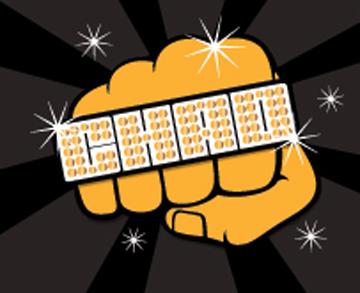‘Chad Deity’ Reflects Perfectly on Our Own Phoniness
By • September 17, 2012 0 1013

“The Elaborate Entrance of Chad Deity” by Kristoffer Diaz is quite a package. It carries a lot of stuff, themes, metaphors and even some poetry, plus a pyro-technic presentation that will wow you.
Down at the Woolly Mammoth Theatre, with director John Vreeke almost convincing theater folks to cheer, hiss and boo for the villains and heroes of this Pulitzer-Prize finalist play by a really gifted new writer, audiences become two audiences. Right there, that’s a very cool thing to happen: people actually get directed, they respond to the demands of the character and the play’s setting. For Woolly audiences, this is not your everyday happening: they’re comprise a tricky grab-bag of tastes, they want their crude moments wrapped in sophistication and their meaningful moments to have some edge, intellectual heft.
“Deity” has all of that, plus a staging that will knock your socks off, accompanied by loud music and noise, videos and punch and spark. It has Diaz’s gift for nailing the pow-pow and tech-tech, multi-culturalization of our more urban spaces in terms of language, its new, fractured phrases and words, its speed and rhythm.
But it’s about . . . wrestling.
So-called professional wrestling at that, that loud, booming, self-marketing sport of raw wrestling, quasi-street fighting, megaphone combination of star-power pull and bull, fake violence made to maybe turn graphic, its carny writ large, and there’s still one born every minute.
There’s precious little not to like here, except maybe the not surprising premise, which is that it’s really sad that wrestling is so duh-damn phony, false and inauthentic. This situation is a tragic one for at least one of the four protagonists in this play. The underlying theme, it struck me, was that wrestling is phony and false, as reflected by American culture (see reality shows, or don’t see). Might as well complain that the dust bowl has too much dust.
The tragic anti-semi-hero in this play is one Mace, a thin, wiry-muscled athletic small guy and fall guy, who understands the sheer beauty of wrestling, and furthermore, knows how to wrestle. But he’s been slated and fated to act the clown, the villain, the loser in wrestling’s every match, but he takes pride even in that, in doing that well. He hates his status but loves the world he lives in. “In wrestling, I make the other guy look good, that’s my job,” he says. “And there’s an art to that.” Mace, played with alarming, sometimes dangerous energy by the gifted Jose Joaquin Perez, understands his role—keep your mouth shut do your job. “I do the heavy lifting,” he says. That’s also what Mace does in this play—he’s the one that is the narrator, the story teller, like Sister Mary Ignatius, he explains it all to you, perhaps a little too much, and in fits and starts. “That’s not really what the story is” is not a phrase you want to hear too often in a play.
Mace is the fall guy for Chad Deity, a muscled, buffed, gleaming, grinning body of charisma. He’s a wrestling, celebrity deity, who can’t wrestle worth a spit, but he has the one thing that’s required: he’s a super-star. Both of them, each in their own way, work for EKO, the pitchman, marketer, owner, promoter and everything for something called THE WRESTLING, an accredited organization that holds power over all.
Enter one VP, a young magic man from the ghett-o, of Indian (as in India) origin who picks up hoops like its no big thing, speaks all the languages of the world, including street, hood and urban of everywhere, who cares not a fig for wrestling or its code, rules and, beauty and grace, its plots of bad guys and good guys and fake aches and hurts. But Mace thinks he’s his way up—and convinces EKO of it, too. Suddenly VP becomes the Fundamentalist, with his sidekick, the former Mace becoming a walking Mexican cliché called Che Chavez Castro, complete with sombrero. The play suddenly turns into a kind of serious farce about us and them, and given this week’s news, probably even a little more disorienting than it already is.
Nothing good can come of this—Deity remains a star, VP wants to undermine wrestling, and EKO can make dirty money and glory out of anything. But there are times in this production that you don’t even notice any of the deeper things going on—you’re too wrapped up in the ring that’s settled on stage from above, in the crashing fake noises as bodies fly around like missiles. It’s true that it is a smaller, more intimate ring. (Imagine all this in the Verizon Center, accompanied by thousands as opposed to a hundred or soin the theater.)
It’s, all said and done, exciting, dramatic, you discover again that wrestling, like reality shows, like politics, are amazingly theatrical. And Perez as Mace, the fast-talking Adi Hanash as VP, the amazing Shawn T. Andrew as Deity and veteran Michael Russotto as EKO are like foils and co-conspirators in a story about battles whose scripts have already been written. They make it worth your while.

